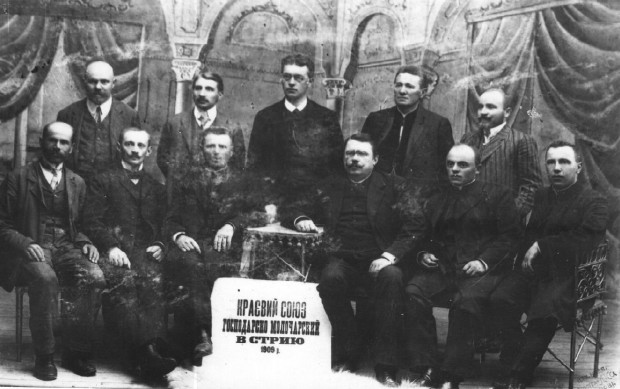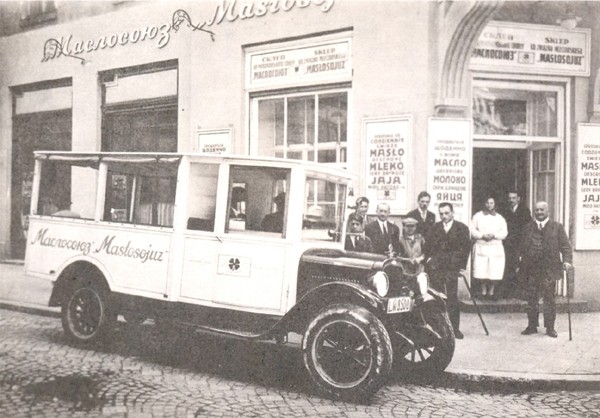Maslosoiuz Provincial Dairy Union
Maslosoiuz Provincial Dairy Union (Краєвий молочарський союз ‘Маслосоюз’; Kraievyi molocharskyi soiuz ‘Maslosoiuz’). An association of dairy co-operatives that was founded in Stryi in 1905 by the Stryi branch of the Prosvita society and was first called the Union of Ruthenian Dairy Co-operatives. From 1907 to 1925 it was known as the Provincial Farm and Dairy Union. The organizers and first leaders of Maslosoiuz were Yevhen Olesnytsky, Ostap Nyzhankivsky, L. Horalevych, and I. Bachynsky. By 1914 it represented about 100 small dairy unions, which together collected some 7.5 million l of milk from peasants and produced about 300,000 kg of butter annually.
The union was reorganized in 1924, after recovering from the First World War. In 1925 it changed its name and statute. Individual members were replaced by corporate members, and new people—mostly former officers of the Ukrainian Galician Army who had graduated from professional schools abroad—took over the management of the union. The main figures in the organization in the interwar period were Olha Bachynska, Andrii Mudryk, Andrii Palii, Mykhailo Khronoviat, T. Kotyk, and O. Lys. Formally its head office was in Stryi, but its real center was Lviv, where its Main Trading Office was located. In 1927 Maslosoiuz began to export its butter to Czechoslovakia and Austria and restored the dairy school that had been founded in Stryi in 1913. Its monthly Kooperatyvne molocharstvo appeared in 1926. To improve efficiency and facilitate mechanization, small dairy co-operatives serving single localities were reorganized into larger regional co-operatives called district dairy associations. The first association was set up in Voinyliv in 1926. In 1928 the associations were reorganized into district dairies, each of which served several villages. Almost all of the district dairies had modern equipment and trained technical staff. The growth of Maslosoiuz is summarized in the following table.
In 1938 Maslosoiuz had 12 departments, with 26 wholesale and 57 retail stores. Its base consisted of 136 district dairies with a total membership of 205,000 farms, which supplied the milk. Maslosoiuz itself employed about 300 people, and the district dairies employed 150 dairy technicians, 64 farming experts (mostly professional agronomists), and 18 veterinarians. The association was the most vital part of the co-operative movement in Western Ukraine, and the leading force behind the movement's modernization. Together with the Silskyi Hospodar society, Maslosoiuz played a major role in modernizing agriculture in Western Ukraine. The Polish authorities, however, restricted its operation to Galicia, where it achieved almost complete control of the butter market, its produce being sold to Poles and Jews as well as to Ukrainians. In Volhynia there was only one department of Maslosoiuz, with two stores in Lutsk. The few district dairies in Volhynia were not permitted to trade with Maslosoiuz. Another two departments were opened in Silesia.
During the first Soviet occupation of eastern Galicia (1939–41) the dairy co-operatives were brought formally under the control of so-called food co-operatives but in effect were subordinated to state control. Most of Maslosoiuz's managers fled to the Generalgouvernement in German-occupied Poland, where they organized about 50 co-operative dairies and a department of Maslosoiuz in Jarosław, which came under the supervision of the Lublin and Cracow branches of the Audit Union of Ukrainian Co-operatives. When the Germans occupied eastern Galicia in 1941, they permitted Maslosoiuz to resume its operations but limited the union's activities to the new Distrikt Galizien of the Generalgouvernement. All dairy farming was brought under the Provincial Union of Dairy Farming, which also took over technical and organizational responsibilities; Maslosoiuz retained responsibility for commercial operations. As the only central organization of dairy co-operatives in Galicia, Maslosoiuz was one of the few institutions that could defend the interests of Ukrainian peasants before the German authorities. In 1943 there were 181 Ukrainian district dairies in the Generalgouvernement, 137 of which were in Galicia. They processed 220 million l of milk, and their gross sales came to over 100 million zlotys. Maslosoiuz was dissolved when the Soviets occupied Galicia for the second time (1944).
BIBLIOGRAPHY
Kachor, Andrii. Ukraïns’ka molochars’ka kooperatsiia v Zakhidnii Ukraïni (Munich 1949)
Vytanovych, Iliia. Istoriia ukraïns’koho kooperatyvnoho rukhu (New York 1964)
Andrii Kachor
[This article originally appeared in the Encyclopedia of Ukraine, vol. 3 (1993).]


